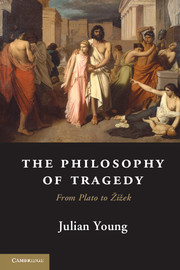Book contents
10 - Nietzsche
Published online by Cambridge University Press: 05 June 2013
Summary
Friedrich Nietzsche (1844–1900) was, from 1869 until 1879, professor of Greek at the University of Basel. A book on Greek tragedy was, therefore, the sort of thing the young academic was supposed to be writing. What turned The Birth of Tragedy (1872) into something other than an academic monograph, however, was the fact that it was written during the time of his intimacy with Richard Wagner, to whom it is dedicated. Nietzsche conceived the work as his contribution to Wagner’s seemingly quixotic but ultimately successful project of raising enough money to build his own, custom-designed opera house in Bayreuth. The fundamental argument of the book is this. The heart of fifth-century Greek life – the highest point in Western civilization – was the tragic festival. Tragedy is being ‘reborn’ (BT 22) in the shape of Wagner’s music-dramas. Hence the new Bayreuth Festival, if it is allowed to flourish, will rescue modern Western life from the desolate condition into which it has fallen.
The important fact about Wagner at the time Nietzsche came to know him is that he was besotted with Schopenhauer, as was the youthful Nietzsche himself. Schopenhauer was, in fact, the principal philosophical bond between the two. In 1869, the year in which their intimacy began, Nietzsche wrote to Wagner (who was the same age as his long-dead father):
The best and most elevated moments of my life are bound to your name, and I know only one other man, and that is your spiritual brother, Arthur Schopenhauer, for whom I have a similar reverence – yea, even more as religione quadam.… At a time when the masses stand and freeze in cold fog it is a great privilege to be able to warm oneself at the light of genius.
- Type
- Chapter
- Information
- The Philosophy of TragedyFrom Plato to Žižek, pp. 169 - 187Publisher: Cambridge University PressPrint publication year: 2013



